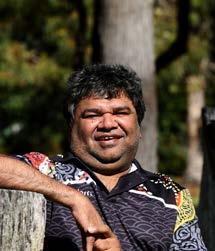
3 minute read
Data An overview of QAIHC electronic medical records and data systems
from Sector Leader Issue 22 August/September 2021
by Queensland Aboriginal and Islander Health Council (QAIHC)
WITH ANNA SHEAHAN DATA OFFICER, QAIHC
An Overview of QAIHC Electronic Medical Records and data systems
Advertisement
In Queensland, Aboriginal and Torres Strait Islander Community Controlled Health Organisations (ATSICCHOs) use a range of four different Electronic Medical Records (EMRs).
The choice between four EMRs at ATSICHHOs—Best Practice (BP), Communicare, Medical Director (MD) and MMEx, is determined by each Members’ health service management/board.
If an ATSICCHO decides to transition EMR this can be a costly and time-consuming exercise but one that may benefit the organisation. Two of the four EMRs—BP and MD—were designed by General Practitioners for clinical recording at mainstream General Practices, while Communicare and MMEx were developed with Aboriginal and Torres Strait Islander health services in mind.
Communicare was established in 1994 and highlights that it is for ‘Aboriginal and Torres Strait Islander organisations who deal with complex care needs in Indigenous and remote communities.’ In other States and Territories, such as SA and NT, Communicare is the most commonly used EMR used by ATSICCHOs. MMEx was established in 2007 by Isa Healthcare Solutions and has a strong focus on Aboriginal and Torres Strait Islander health. Many services across Australia have now also successfully rolled out MMEx cloud-based software including Institute of Urban Indigenous Health. MMEx also has an inbuilt data reporting software called Insights.
Reporting tools and data extraction capability are built into all EMRs however they have variable capabilities for CQI and auditing. Therefore, since 2009 QAIHC have issued PenCS Clinical Audit Tool (CAT) licenses for Members. This allows Members’ staff to view, interrogate and extract data and patient reports for internal use. Since 2005, QAIHC have also utilised the Practice Aggregation Tool (PATCAT) due to its interoperability capability to aggregate data from all four EMRs, allowing QAIHC to access de-identified data from Members under data service agreements. The PenCS tools have many quality improvement features and also a clinical decision support system (Topbar).
A frustration with the current mainstream EMRs and PenCS data systems is that they do not capture all the work (or data) from all of the ATSICCHOs/programs delivered, for example, family wellbeing services or social determinants information.
JustCare is a supplementary software program which runs in conjunction with Best Practice Premier. It was initiated in 2020 and is designed by a General Practitioner working in an ATSICCHO. This program integrates with the existing practice database and provides a platform to manage data, workflow, resource/staff management, nKPI and Primary Mental Health Care Minimum Data Set monitoring/ reporting and program delivery.
Another limitation of current EMRs is that they do not operate from a holistic or cultural lens and they are not community owned or operated software companies. In Canada, there is one such EMR solution that meets these criteria for its Indigenous community called Mustimuhw. This community controlled EMR is both a health and wellbeing software tool designed specifically for Indigenous Community Controlled Health.
EMRs and data reporting systems can elevate the care which services provide and offer structure and support for the model of care that ATSICCHOs deliver.
Feedback from the QAIHC Member Conference has prompted the QAIHC Health Information Team (HIT) to research and plan towards future proofing EMRs and data reporting structures and systems.
QAIHC’s Health Information Team (HIT) is planning for a future for Members where technology and patient care is supported and continues to be enhanced by EMRs and data systems, which is imperative for the sustainability of our Sector.
ATSICCHO Data System
Electronic Medical Record (EMR) Patient Information System (PIRS) and billing software
THE PATIENT THE PATIENT
Record Tool Record Tool THE PRACTICE THE PRACTICE
Clinical Audit Tool Clinical Audit Tool QAIHC-HOSTED
THE POPULATION THE POPULATION
Practice aggregation tool for groups of data Practice aggregation tool for groups of data for ASTICHHO, regional and QLD comparisonsfor ASTICHHO, regional and QLD comparisons
For all Helpdesk and general HIT enquiries, please email hit@qaihc.com.au or phone 3328 8500








